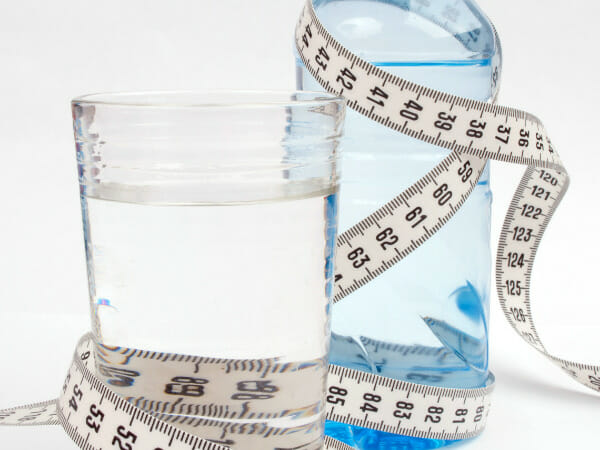Why Water Fasting Is Growing in Popularity
Several eating regimens like intermittent fasting guarantee weight reduction and other health benefits. Essentially, water fasting is another method that has been practiced to help with weight loss. However, like any other dietary fad, this routine has upsides and downsides.
There is no one-size-fits-all method to a healthy lifestyle and a single route in the wellness world. It’s an individualized process, and a specific approach may not be reasonable for everybody. Thus, consult with a registered dietitian or healthcare professional before beginning a new diet plan or a way to lose weight.
You’ll have to drink two to three liters of water a day on a water fast. Water fasting has been around for centuries, undertaken by different cultures for religious or spiritual purposes or to attempt to battle specific health conditions. Notably, as of late, individuals have adopted water fasting to assist with flushing toxins and detoxing the body, such as the infamous lemon detox cleanse or intermittent fasting. It is likewise practiced to shed additional bodyweight rapidly.
Periodic water fasting might assist you in losing weight, albeit different techniques might be more viable in the long haul. Furthermore, most practitioners use this method to lose weight or improve health. Thus, there are ways to ensure that it is done correctly for reduced risk if losing weight is your priority. Even though water fasting yields potential benefits, it additionally isn’t, by and large, suggested and is accompanied by many health risks. Please continue reading to track its procedures and check whether water fasting works for you.
How to begin Water Fasting?
There is no uniform fasting protocol and scientific guidelines for water fasting. The methods can fluctuate if you follow a different fasting schedule, such as intermittent fasting or alternate-day fasting.
It is generally a straightforward process, but it is important to note that most practices are endorsed and accounted for by health and wellness advocates without medical accreditations; thus, it’s crucial to seek professional medical advice. Suppose you have never abstained from eating and drinking coffee, alcohol, tea, and sports drinks; only water. It’s recommended to accustom and set up your body for the fast.
An extended period of water fasting without medical supervision is also not suggested. You may lose weight, but this food deprivation denies the standard assortment of fundamental supplements, nourishments, and nutrients that food intake can only acquire.
Stages of a 24–72 Hours Water Fast
Water diets regularly last 24 to 72 hours, yet medically supervised water fasts or a part of medical procedure might endure longer. Here’s a breakdown of a typical course in water-only fast:
Preparation (1-3 days prior)
In preparation, what you consume before the fast can emplace the following couple of days for a more substantial likelihood of a successful and safe fast. The 48 – 36 hours before the fast are critical to set up the body and headspace. You can do this by consuming more modest portions at every feast. In addition, starting to enforce a 16-hour fast for the day or two preceding will give the human body time to adjust. Eating light and healthy meals and withholding from devouring any processed foods will permit your body to all the more likely contribute to a fruitful experience for autophagy and cell recharging and profit from the health benefits of the fast.
2-12 Hours Water Fasting
Twelve hours of water fasting entails you’ve entered the metabolic state called ketosis. You have crossed the threshold when your body begins to break down energy from not having enough carbohydrates.
Thus, commence burning stored fat, producing ketones to fuel the body.
3-18 Hours Water Fasting
Cessation of food consumption by 18 hours activates a metabolic switch from glucose-based to ketone-based energy. According to a study, this metabolic switch happens in the third period of the water fast. Wherein glycogen stores in hepatocytes are exhausted. Then, accelerated adipose tissue lipolysis produces increased fatty acids and glycerol.
In short, a period of fat-burning mode.
4-24 Hours Water Fasting
After 24 hours of water fasting, cells reuse old components and break down misfolded proteins. It marks an autophagy process; research shows that prolonged fasting induces profound neuronal autophagy. This process is the body’s approach to clearing out damaged cells to regenerate newer, healthier cells and begin immune system regeneration.
5-48 Hours Water Fasting
Around this period, with limited calories, carbohydrates, and protein, the growth hormone level has expanded up to five times higher than at the inception of fasting. In short, according to extensive analysis, it’s where growth hormone level increases.
6-54 Hours of Water Fasting
Within 54 hours, insulin levels will be at their absolute lowest level. Ketone levels will also increment further, and the body becomes progressively insulin-sensitive. It prompts the body to assist in having a healthy body fat percentage, reaching peak autophagy, and reducing inflammation.
7-72 Hours of Water Fasting
At last, arriving at the endpoint of the 72-hour water fast, this is where the body breaks down old immune cells. It now breeds stem cell production, oxidative stress reduction, and new resistant cell generation.
Post-Fast
The post-fast phase is a critical stage of the whole process since, after multiple days without any food, the digestive system needs something light and easy to process.
Just like the first stage, this is a preparatory step to allow the system to get acclimated to food intake before starting on large meals.
You ought to fight the temptation to eat a significant feast and devour solid foods. Instead, it is recommended to break the water fast by consuming a smoothie or smaller portions; this guarantees you don’t disrupt the system by letting the body readjust before reintroducing your old eating habit.
It may also escalate to a risk of refeeding syndrome, a fatal condition in which the body goes through brisk fluid and electrolyte levels changes.
What are the Potential Health Benefits and Dangers of Water Fasting?
There are potential benefits of water fasting; however, it means a lot to note that studies on the safety of this practice are inadequate and with significant evidence pointing instead toward the possible health risks.
Health Benefits
Here are the potential health benefits of a water fast:
Lowers Blood Pressure
It’s a known fact that drinking more water and lessening salt consumption are two natural ways to lower blood pressure. A water fast will equip you to do both of these things. Research shows that medically regulated water-only fasting (10-14 days) might assist individuals with high blood pressure or borderline hypertension lower their blood pressure. However, the connection between 24-72 hour water diets and blood pressure still lacks further investigation and studies.
Promotes Autophagy (Cell Recycling)
Autophagy is a self-degradative process and also holds a housekeeping role in removing damaged organelles, eliminating aggregated proteins, and clearing intracellular pathogens. In short, old parts of the cells are broken down and recycled.
This cycle is inferred that might play a function in cancer, heart disease, and Alzheimer’s disease prevention.
Few human studies link water fasting, autophagy, and disease prevention. More advanced exploration is required before prescribing it to promote autophagy.
Helps Decrease the Risk of Diabetes
Research shows that periodic fasting might aid in improving leptin and insulin sensitivity.
Your bodies create and produce the hormone Insulin in your pancreas. It is a gland behind your stomach that helps balance your blood glucose levels. Leptin is a hormone that aids in administering energy balance by repressing cravings.
Diabetes occurs when your body doesn’t utilize insulin appropriately or make sufficient insulin. There are two fundamental types of diabetes:
With type 1 diabetes, your body can’t process glucose due to inadequate insulin or low blood sugar. Type 2 diabetes is where glucose levels build up in your bloodstream.
Thus, it’s conceivable that short-term water diets can further develop insulin resistance leptin sensitivity to help lower the risk of diabetes and decrease the risk of obesity.
Lowers Risk for Cardiovascular Disease
In one study, 30 healthy participants followed a 24-hour water-only fast. Toward the end of the fast, they significantly showed lower levels of triglycerides and cholesterol, which are the two vital risk factors for heart disease.
The study concluded that fasting instigated intense changes in metabolic, cardiovascular, and general well-being biomarkers. The long-time outcomes of these short-term changes are obscure. And yet, there are assessments of occasional interim fasting ought as a preventive treatment with the possibility of lessening metabolic disease risk.
However, there are studies that water fasting can help heart disease. There’s a requirement for more research on people before making recommendations.
Risks and Dangers
Even though a few potential benefits of a water fast, it also has significant drawbacks. Always keep in mind that when symptoms persist, contact a medical professional.
The following are a couple of risks and dangers of water fasting.
May lead to Dehydration.
Even when you drink water during the fast, it could still cause Dehydration because 20-30% of your regular water consumption comes from the food you intake.
You might have to drink more than usual to avoid getting dehydrated to get sufficient water. Drinking two to three liters is the daily recommendation.
Risk for Nutrient Deficiencies
Any fasting can jeopardize the needed supplements for the body to function appropriately. Calorie restrictions entail not gaining essential minerals, nutrients, amino acids, electrolytes, and unsaturated fats, which leads to nutrient deficiencies.
Hypotension and Orthostatic Hypotension
Experiencing hypotension and orthostatic hypotension is common among individuals who water fast.
Hypotension means low blood pressure, contrary to hypertension or high blood pressure. On the other hand, orthostatic hypotension is similar to a drop in blood pressure when you unexpectedly stand up. It may be acute or chronic and symptomatic or asymptomatic. Common symptoms are lightheadedness, dizziness, blurred vision, fatigue, weakness, nausea, headache, and palpitations, leading to accidents or other health reasons.
When you encounter these symptoms above during a water fast, it’s a sign that this may not be suitable for you, and seek advice from a medical professional.
Hyponatremia
When the concentration of salt in your blood is deficient, Hyponatremia occurs. Sodium is an electrolyte, and it helps control and regulates how much water is in and around your cells.
You should avoid exercise during a water fast since you shed salt through sweat. You cannot obviously replace it by eating food or drinking sports refreshments.
May Aggravate Eating Disorders
There is substantial evidence that fasting might worsen eating disorders such as bulimia. It can prompt binge eating and refeeding syndrome after the fast.
Refeeding syndrome is a potentially fatal condition and possibly catastrophic changes in fluids and electrolytes in malnourished patients. These rapid shifts result from hormonal and metabolic changes and may cause clinical complications.
To avoid refeeding and metabolic syndrome, wellness professionals recommend following a guideline where calories are gradually present after extended fasting.
Who shouldn’t Water Fast for Weight Loss?
Water fasting can be incredibly detrimental to specific groups with certain medical conditions since it can be mentally and physically tiring. Thus, do not partake in this extreme endeavor if you have the following medical conditions or health complications:
- breastfeeding or pregnant women
- history and having an eating disorder
- underweight
- on medication
- undergoing blood transfusion
- have diabetes and heart problems
- have thyroid disease, organ disease, muscle weakness, or other chronic diseases
Before you embark on any fasting plan, seek medical supervision or your healthcare provider.
Conclusion
Although there might be some medical advantages to water fasting, there are still more secure alternatives to losing weight. Reducing calorie intake, a healthy diet, and regular exercise are viable for weight loss and the safest route than going through an abrupt, rapid weight loss. Options such as intermittent fasting can be more sustainable in the long run. It could also have more medical benefits concerning reducing the risk of cancer cells or heart disease and diabetes than a prolonged 24–72 hour water-only fast.





